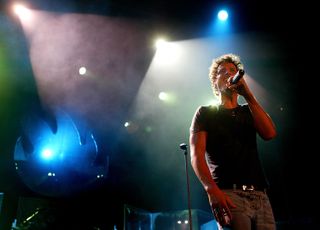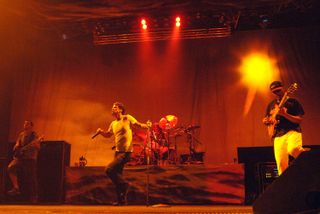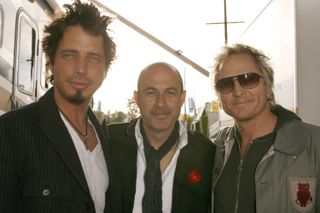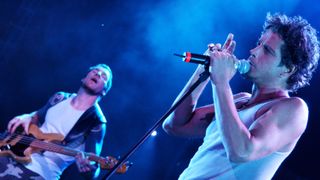Two-times Grammy winner, singer-songwriter and voice of a generation, Chris Cornell has been there, done that and bought the T-shirt. With successful careers with both Soundgarden and Audioslave now behind him, the intense singer was now about to start a new venture and release his second solo record, Carry On.
When, where and why did Audioslave decide to call it a day?
Well, ‘when’ was kind of yesterday, really. Here [LA] is the ‘where’. Why? Well, it’s really the typical reasons bands split up, I suppose. But for Audioslave maybe it was a little more likely to happen.
You have a band made up of people from two previous bands that were pretty important to different kinds of rock music at the time that they happened; Soundgarden had been together for a long time and had a lot of experiences; Rage Against The Machine was the same thing. But the next band you’re in, you don’t want to have any arguments or trials and tribulations – you’ve been through that. And Audioslave suffered from that a little bit. Certainly my attitude was: I don’t want to be in another band unless we’re having a good time, it’s easy to do it and it’s fun for everybody. Those guys also agreed. But then we started having issues early on.
It’s nobody’s fault, but it created a problem early on and one that exists even up to now: three guys from a previous band [RATM’s Tom Morello, Brad Wilk and Tim Commerford] who have been together for years and years and have a particular way of how they do things and who they work with; and me being an outsider, I’m pretty good at sticking up for myself and basically saying what’s on my mind. These guys have a way they work together and the way they make decisions. My way is not that way, and I tended to be disagreeing with those three, and I would be the odd man out. Like I said, I don’t think it was anybody’s fault, it was just a situation that was there.
But presumably you knew about that dynamic going on before you joined them?
Sure. It’s not a surprise at all. When a band starts making records it’s not a situation where you say: “Okay, we’re going to be a band forever, come hell or high water, no matter what.” And I’m certainly not that guy either. I stayed in the band and made three great records as long as I wanted to be in the band. And now I don’t want to be in the band anymore, which is fine. I’m not unhappy that I started out in the band and I’m not unhappy that we made those records and toured. I had a great time.

How is your relationship with the three of them now?
Well, I don’t really talk to them and I don’t really have a friendship. But in terms of how you classify a friendship, I don’t think it’s something where we’d ever hang out or go have dinner or go to each other’s houses. We really focused on the band and got along great for the most part. Same with Soundgarden. It’s not a situation where we hated each other or were at each other’s throats. That didn’t happen. We’re adults.
What’s next for you? Are you going to be a solo artist, or will you look to be part of another band?
I don’t really need a band. I feel at this point in my life I shouldn’t really be in a band – there’s no real point in it. I feel I can do more creatively in every direction alone than with the parameters a band brings and the limitation a band brings. If you have a band, everyone should rightfully have a say in things that happen musically. And immediately what that does is reduce the spectrum of what you can do as a band.
On your new album you’ve covered Michael Jackson’s Billie Jean. How did that come about?
I was having lunch with Michael and he was wearing a dress and it reminded me of that song… No, I was having a conversation with my wife about cover songs, and I was explaining that the ones that are the best are the unlikely couplings of an artist with a song you’d never expect. She wanted an example of that; I thought one of them was when Johnny Cash did [Soundgarden’s] Rusty Cage.
After that I started getting phone calls and people leaving messages about how great the lyrics were. No one had ever said that about that song when all they had heard was the Soundgarden version. They were focusing more on the aggression. And Cash slowed it down, kind of shone a new light on it and added a new emotion to it. So when I was forced to come up with an example of an artist I might cover, I was trying to think of someone the furthest away from anything that would make any sense at all. And Michael Jackson just popped out.
Did you like the Jackson original in its day?
Yeah. Once I came up with Michael Jackson, I had to come up with a song [laughs]. And that was the only one I could even think of – and not just the song but the video. He had a little air of mystery around him in that video; suddenly he looks different. His hair is different, his nose is different, he’s wearing a hat and different clothes and his dancing was different. It had come a long way. That was one moment when Michael Jackson was actually really cool.
I read the lyrics to Billie Jean and I thought they were really great. Those aren’t song lyrics that you’d hear in a pop dance track – they were personal. Then I tried singing it. And I thought that song would be easy because I could do some electric guitar at the beginning and maybe it would sound sort of AC/DC-ish. But it just sounded ridiculous. It didn’t work.
But then I did something which I do to a lot to songs where if I’m not really finding the voice or finding my way around it right, I’ll switch it to a kind of gospel signature. I did that and all of a sudden it came alive. I was singing, and all of a sudden my voice sounded good singing the lyrics. It felt normal and it was comfortable to me. And then I really liked it. It was really fun because people don’t know what it is at first. It’s such a different version of the song that some people have thought maybe it’s one of my old songs they’ve forgotten about.
Have you tried to move away from the Audioslave sound?
Well, it was pretty easy because with Audioslave we wrote everything together, and I didn’t really write any riff-oriented songs for Audioslave. I wrote maybe a couple of songs entirely, but the rest I would write parts for. So because it was a collaboration in that way, just me writing songs on my own sounds pretty different. I didn’t have to think about it consciously. Just writing songs would naturally be different.
Do you think that if the last Audioslave record, Revelations, had sold better you might still be together?
I think the record didn’t do as well commercially because we weren’t together.
Does being a family man make it more difficult to tour?
No, I think it makes it easier than it’s ever been because they can travel, they come with me. My wife’s travelled, and our babies have travelled with us all the time since they’ve been born so they’re used to it. So it enabled me to do a lot of touring. And that’s a really lucky thing, because usually when people are in rock bands they get to a point where they have children and then touring becomes a really difficult prospect.
I think it can be a great thing for children as long as there’s some normalcy. Obviously I don’t want the children being around what’s known as the rock’n’roll lifestyle, but I would never allow that. But for my part, if I’m on the road or touring it’s really quite normal; there’s no drugs or alcohol or stupidity – nothing that a kid can’t be around.
- Soundgarden: the story behind Jesus Christ Pose
- Q&A: Chris Cornell
- Chester Bennington on Soundgarden's Superunknown
- Cornell keen on Audioslave reunion
If you’re touring now with your new band would it be a rule that there’s no drinking or drugs?
Definitely. Even if I had no family there would be no drugs around. I don’t care if somebody drinks a little bit, but as far as getting loaded… My experience pretty much across the board is that if someone’s doing that, the music is not coming first.
Definitely with Audioslave the music always came first. Soundgarden, to a degree, suffered sometimes because of alcohol, for example. Or from just being on the road, and raging and spending all night being awake then playing a show.
And you need to be young to do that.
Yeah. And there are a lot of days when it was hard to be up on stage and do what we did. There were a lot of shows and performances that weren’t that great. It was a fantastic band, and we ended up being inconsistent live because of a lot of extracurricular activities. It was part of who we were and I don’t regret it. We had a lot of fun and it was exciting, but it’s also probably part of why we’re not a band now.
Any chance of a Soundgarden reunion? If The Police can do it…
I don’t think so [laughs]. Somebody has to really rally behind it and make it their goal in life to make that happen, and I don’t think any of us feel that way.
Are you still in touch with those guys?
Not often, but we’ve always been friendly.

How’s your restaurant in Paris going?
Good. Great. Surprisingly it’s something that’s become popular and it has done really well. It’s a small place in the neighborhood we live in in Paris. It’s everything that I wanted it to be. And for the first time in my life I’m part of a community that I live in. It’s not that easy to do when you’re a touring musician. And it’s a place where I can go and hang out. It’s like inviting people into your living room in a way.
Are you able to be anonymous there?
Yes and no. I mean, it’s a different vibe. I think that as the years go by more and more people know who I am and know that I live there. But I’ve never had huge record sales in France at any time, really, so it’s not the same as if, for example, I was hanging out at a restaurant in Seattle or LA. There’s a certain amount of anonymity and I can go anywhere I want. I really feel like I can do that, anyway.
I’ve always been able to do that. I think there’s an attitude that goes along with success or fame that really has a lot to do with what your lifestyle is like. I’ve always wandered around without security anywhere, and sometimes people recognise you and sometimes they don’t but it doesn’t really matter. I think it depends on how the person perceives it and themselves. If you walk around with big bodyguards and have someone driving you it creates something that you have to deal with. If you don’t, you’re just another person.
So what do you think of the Paris Hilton/Jessica Simpson phenomenon – they claim to have to walk around with bodyguards.
I don’t think that has anything to do with music. It’s like a modern version of selling a marque or an attitude. They’re like living toys in a way. They sell fragrances or handbags; they don’t seem to have talent or anything. They don’t seem to have a product to sell other than that. It’s sort of like by association, and that association is built not on success so much but on the tragedy of their failures. And they seem to be doing the best when Paris Hilton has a newly discovered porno or Britney Spears got fat and was seen throwing up in public. That’s when they seem to be getting the most coverage [laughs].
Who makes videos of themselves having sex, anyway? Who does that?
Yeah, I know! Especially when you let some dude you’ve been with for a weekend make a video and then you don’t take the tape with you. Oh? It showed up somewhere? You think! [laughs]
You’ve done an advertising campaign for designer John Varvatos. How did that collaboration come about?
He’s a great designer out of Detroit. He’s been working with a rock photographer for a few years now, doing pictures of his ad campaigns, and Danny [Clinch, photographer] has been a friend of mine and he worked with Audioslave on the first record. And the ad campaigns really have been what they thought of as rock icons versus using models. The most recent was Iggy Pop.
The one that I saw that I thought was really cool was Joe Perry and his son. They were just shooting pool, but on the bottom it says ‘John Varvatos’. I didn’t even know what it was. I thought it was an article on this guy and his kid. I didn’t know. And I thought it was really cool. They asked me if I would be interested in doing something like that, and I thought if it was in that context that would be great. I’ve never done anything like that before.
You have this iconic status, yet you seem like a low-key guy… and the family man with wife Vicky Karayiannis.
Yeah, it’s… I have the ability to do all these different things that are sort of unusual and exciting, and I kind of want to do everything once. But I also want to stay away from some sort of unilateral self-promotion because I don’t think that really helps in terms of music, especially with the fact that television is included too.
And that’s something to look at, because when I was a child growing up in the 70s, if you were a famous rock musician the only people who were going to know what you looked like were fans of yours, really.

How important is it for you that your new solo record does well?
For me it’s the same as any other record, in that as far as I’m concerned it’s always successful if I like it and I feel like I’ve accomplished something musically. Which I do on this record. After that it’s out of my hands; it doesn’t really matter.
Do you get nervous during the first week of a record’s release?
Yeah, for sure. I want people to like it or want to hear the music that I just created. I want to reach the most people as possible and I want to feel that people like what I do. Having said that, for example Euphoria Morning [Cornell’s debut solo release from 1999] is a record that sold 400,000 copies. That never really bothered me; I don’t feel that was a record made for mass consumption. My chief goal on that record was to make something that didn’t sound like anything I’d done before.
The whole question of the importance of records doing well in 2007 is an odd one anyway, because it’s so unpredictable and the market for the hardware of an actual CD has dropped 60 per cent. I want people to hear my music, I know that that’s possible. And then fortunately having the experience that I’ve had, and the ability to actually go out and perform and create a good live performance for people consistently, what’s most important to me is the opportunity for people to hear it in whatever way, whatever form – people can come and see me live, that’s important too.
I want to make only the records I want to make, write only the songs I want to write and not have to ever worry about commercial success. But when I put out a record I’d like it to sell a ton anyway [laughs]. Why not? It doesn’t always happen, and I’ve had little ups and downs, but as long as I’m inspired by music that I create there always seems to be someone that wants to hear it.
This article originally appeared in Classic Rock #106.
For more on Chris Cornell and Audioslave, then click on the link below.

